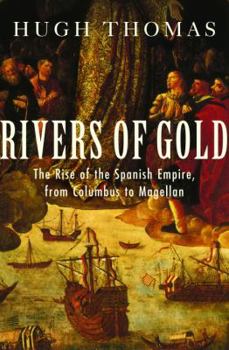Rivers of Gold: The Rise of the Spanish Empire, from Columbus to Magellan
(Book #1 in the Spanish Empire Series)
Select Format
Select Condition 
Book Overview
The first part of his trilogy on the Spanish Empire, Hugh Thomas's Rivers of Gold brings the rise of Spain's global empire vividly to life, capturing the spirit of an ebullient age. Inspired by hopes... This description may be from another edition of this product.
Format:Hardcover
Language:English
ISBN:0375502041
ISBN13:9780375502040
Release Date:June 2004
Publisher:Random House
Length:720 Pages
Weight:2.53 lbs.
Dimensions:1.7" x 6.4" x 9.5"
Customer Reviews
3 ratings
The Spanish Empire: Glorious and Devastating
Published by Thriftbooks.com User , 17 years ago
Rivers of Gold is an extraordinary book on the rise of the Spanish Empire from 1492 to 1522, which deals particularly with Spain's discovery and conquest of the Americas. Written by one of the most formidable and respected historians on the subject, Hugh Thomas, this book covers it all: the whos, the whats, the whens, the wheres, the whys and the hows are all answered for in great detail. Here you will be introduced to some of history's most influential figures, like; Columbus, Ponce de Leon, Queen Isabella, King Fernando, King/Emperor Charles, Bobadilla, Ovando, Cisneros, Magellan, and many, many others. Spain's discovery and conquest of the Americas, as Thomas recounts, brought a certain excitement, pride and triumph to Europeans. Even today in the Western World, it is viewed as something rather glorious. And indeed, Columbus's voyage was with all respect quite the astonishing feat. But to the Indians who inhabited this "New World" for thousands of years, we see a much different picture; one of great devastation. As soon as the Spaniards discovered the Americas, they claimed it for Spain. They settled there, opened a brutal slave trade, ruthlessly explored for gold, and feverishly forced the Indians to adopt their culture and convert to their religion. The Indians, perceived by the Spaniards as uncivilized and therefore unworthy of freedom, became subject to cruel oppression. Other factors, like war, famine, and disease contributed to a rapid decline in Indian population. In some places, like, Jamaica, the Indians (in this case, the Tainos) were gradually exterminated. In Cuba, within a few decades, the Spaniards came to realize that they were running out of Indian slaves. The solution? Bring more slaves from Africa! This explains why Cuba, Jamaica, Brazil (colonized by Portugal), and other countries have such a large black and white population, including mixed, whereas the Indians - along with their ancient pagan religion - are either almost or entirely extinct. But as Thomas tells us, not all Spaniards were inhumane in their treatment of the Indians. A very few, like the Dominican priest Bartolomé de Las Casas and preacher Fray Antonio Montesinos vigorously preached against their mistreatment. But unfortunately, to most Spaniards, that is; conquerors, explorers, settlers, and religious authorities such as Cardinal Cisneros and Bishop Fonseca, the Indians were regarded as mere savages, and by their treatment of them, equivalent to cattle. (Many Spaniards owned dozens and even hundreds of Slaves). Even the heroic Columbus himself was not exactly a nice guy either, since he was the owner of several slaves and was quite the greedy and sometimes deceiving type. But at the other extreme, I also found it disturbing that some of the Indians practiced cannibalism (although greatly exaggerated by the Spaniards to justify forced conversions and slavery) and human sacrifices, hence explaining why Indians were perceived uncivilized. But were the Span
5 stars for research, 3 stars for readability
Published by Thriftbooks.com User , 20 years ago
Rivers of Gold is thoroughly researched and documented, but at times the author loses sight of the forest for the trees. Several chapters are written in an engaging style, particularly those focusing on Columbus' arrival in the New World and the sections on Mesoamerican cultures. However (as is pointed out in other reviews), the author seems to dwell on accounting for everyone who had even the most minor role in the exploration of the Americas. It takes a while to navigate all these names, many of which merit one mention with no connection to later events or consequences. That said, Rivers of Gold is a useful text for serious students of this key historical period.
Pages of Pure Gold
Published by Thriftbooks.com User , 20 years ago
Thomas' journey through the early history of the Spanish Empire is fascinating and it is much more than the simple tale of the adventurers and sailors that first set the feet in the New World: Thomas' provides and impressive amount of information on the society of the Reinassance Spain: not only about the dinastic combinations and wars that unified the kigdoms of Spain and linked them to the Burgundian and Austrian royal families but also on the peoples that co-existed in Spain at the time, from poor moorish peasants to Italian traders, from Catholic bishops of Jewish origin to slaves from Africa, from empoverished hidalgos to soldiers of fortune. Thomas analyses the evolution of the State and the birth of the modern bureaucrathy. Only from this economic, social and ideological background can be understood the visionary trips of Columbus, the unfortunate and violent first settlements in the Caribbean and the heroic adventures of the conquest of Mexico and the circumnavigation of the Earth. The approach of Thomas is honest and scientific. He analyses the historical facts according to the perspective of the time and supporting his views with an impressive amount of material not only from other historians but from documents of the Xv and XVI centuries.Moreover, the book is rich (at least the Spanish edition, El Imperio Espanol) in extra materials such as maps, documents (3 annexes including the story of the first free African in America, a companion of Cortes that introduced the wheet in the continent) and notes.To summ up: a great book






